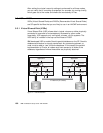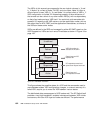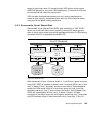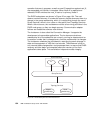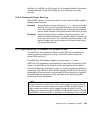196 IBM Certification Study Guide AIX HACMP
9.4.2 Eprimary Management
The SP switch has an internal primary backup concept, where the primary
node, known as the Eprimary, is backed up automatically by a backup node.
So, in case any serious failure happens on the primary, it will resign from
work, and the backup node will take over the switch network handling,
keeping track of routes, working on events, and so on.
HACMP/ES used to have an Eprimary management function with versions
below 4.3; so, if you upgrade to Version 4.3 and also upgrade your switch to
the SP switch, and you had configured Eprimary management previously
within the HACMP definitions, you have to unmanage it.
To check whether the Eprimary is set to be managed, issue the following
command:
odmget -q’name=EPRIMARY’ HACMPsp2
If the switch is set to MANAGE, before changing to the new switch, run the
script:
/usr/es/sbin/cluster/events/utils/cl_HPS_Eprimary unmanage
As the SP switch has its availability concept built-in, there is no need to do it
outside the PSSP software, so, HACMP doesn’t have to take care of it any
more.
9.4.3 Switch Failures
As mentioned before, a node in the SP is still restricted to have a maximum of
one switch adapter installed. Therefore, even with the software being able to
assign a new primary node within the SP and outside of HACMP, the switch
adapter is still a single point of failure.
If the switch adapter in a node resigns from work due to a software or
hardware problem, the switch network is down for that node.
If any application running on that node relies on the switch network, this
means that the application has virtually died on that node. Therefore, it might
be advisable to promote the switch network failure into a node failure, as
described in 2.6.2.1, “Single Point-of-Failure Hardware Component
Recovery” on page 46. HACMP would be able to recognize the network
failure when you configure the switch network as an HACMP network, and
thus would react with a
network_down
event, which in turn would shut down
the node from HACMP, causing a takeover.





